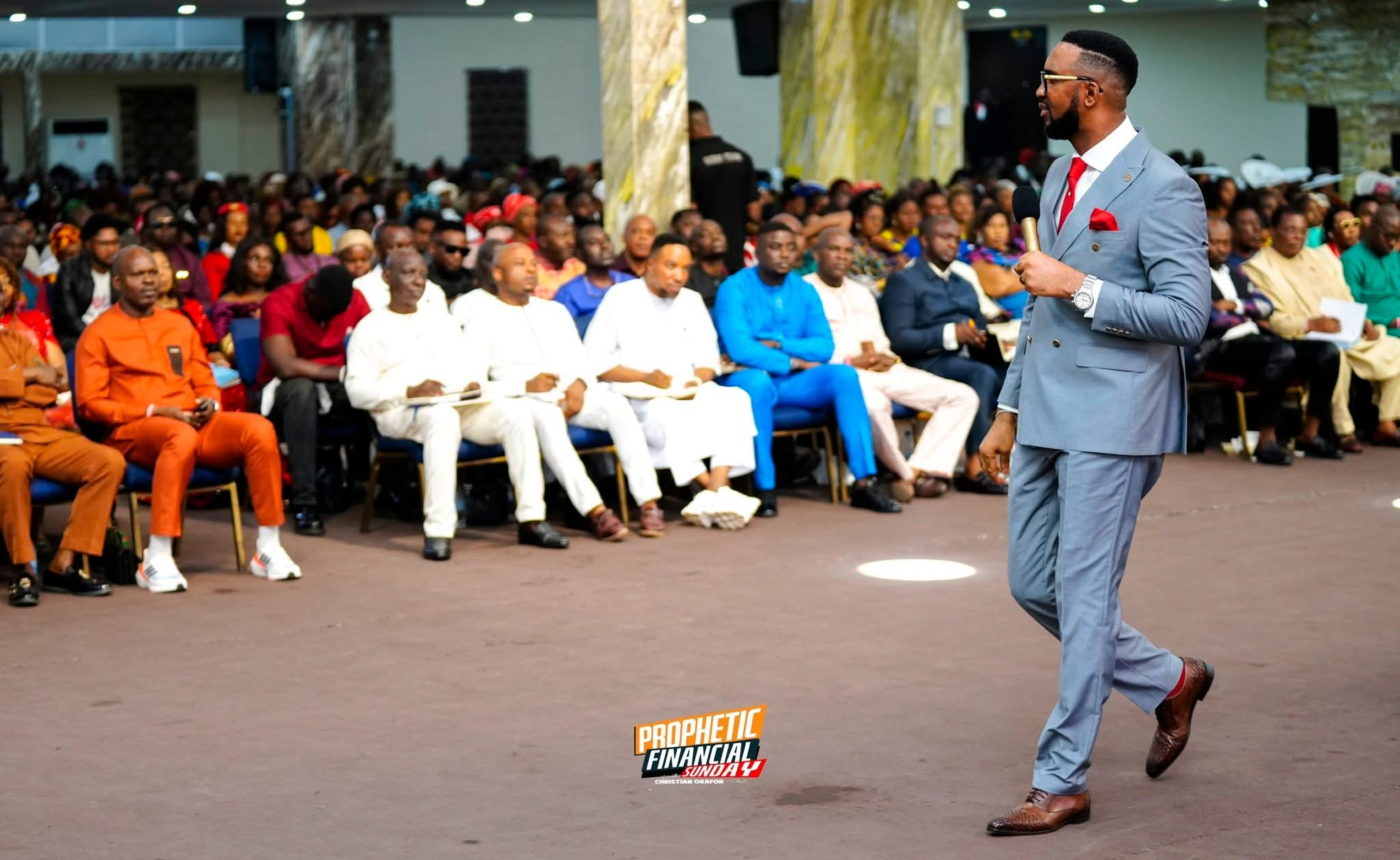celebrity radar - gossips
Every Pastor Who Collects Tithes is a Thief – Pastor Femi Aribisala

Popular pastor and public affairs analyst, Femi Aribisala has berated the act of collecting tithes by their churches which he believes is not biblical.
As far as many pastors are concerned, the most important scripture of all is not to be found in the word of Jesus. Neither is it even in the New Testament. That scripture says: “‘Bring all the tithes into the storehouse, that there may be food in my house, and try me now in this,’ says the LORD of hosts, ‘If I will not open for you the windows of heaven and pour out for you such blessing that there will not be room enough to receive it.’” (Malachi 3:10).
This scripture is drummed repeatedly into Christians on Sundays. However, the only time Jesus mentioned tithing in scripture, he pointed out that it was not a weighty matter of the law. (Matthew 23:23). Hebrews says people only receive tithes “according to the law.” (Hebrews 7:5). It then insists tithing (and everything else under the law) has been annulled: “The former regulation is set aside because it was weak and useless.” (Hebrews 7:18-19). Nevertheless, mercenary pastors continue to insist on the payment of tithes.
Latter-day Pharisees
Jesus rebuked the Pharisees for keeping part instead of the whole law. (Matthew 23:23). That is what tithe-collecting pastors do today. If we insist our congregants must pay tithes, we must also insist that they keep the rest of the law. James says: “Whoever shall keep the whole law, and yet stumble in one point, he is guilty of all.” (James 2:10). Therefore, if we insist on tithing, we should also refrain from eating pork. We should stone adulterers, execute homosexuals, kill Sabbath violators and restore blood-sacrifices.
Tithe-collecting pastors counter this by maintaining the payment of tithes pre-dated the law. Here Abraham is cited as the cardinal example of someone who paid tithes before the promulgation of the Law of Moses, as did Jacob, his grandson. However, such arguments are disingenuous.
Before the law, tithing was at best an example but not a commandment. Moreover, pastors fail to mention that Abraham only tithed once in his lifetime. When he did, he did not even tithe his own money: he tithed the spoils of war. He gave ten percent of the plunder he took when he rescued Lot to Melchisedec, king of Salem. But then he did not even keep the rest but returned it (all ninety percent) to the king of Sodom.
For his part, Jacob also tithed only once. He did this in a “let’s make a deal” arrangement he offered to God: “Jacob made a vow, saying, ‘If God will be with me, and keep me in this way that I am going, and give me bread to eat and clothing to put on, so that I come back to my father’s house in peace, then the LORD shall be my God. And this stone which I have set as a pillar shall be God’s house, and of all that you give me I will surely give a tenth to you.’” (Genesis 28:20-22). This kind of deal about accepting God only under certain self-serving conditions should certainly not be a term of reference for any serious believer.
Lies upon lies
The first lie pastors tell Christians is what some have referred to as “the eleventh commandment:” “Thou shalt pay thy tithes to thy local church.” But the bible says no such thing. The storehouse of Malachi was not a church. It was a place where food was kept.
Pastors hide from church-members the fact that money was not acceptable as tithe. The tithe was a tenth of the seed and fruit of the land and of the animals which ate of the land. (Leviticus 27:30-32). That is why God says: “Bring all the tithes into the storehouse, that there may be FOOD in my house.” (Malachi 3:10). He does not say “that there may be MONEY in my house.” The food was used to feed the Levites, the poor, widows, orphans and strangers.
Pastors also conveniently fail to teach the biblical tithe. The principles of tithing were not laid down by Malachi. They were laid down by Moses. The study of Moses’ guidelines quickly reveals that the biblical tithe has no application whatsoever to Christians and is mischievously violated by tithe-collecting pastors today.
According to the Law of Moses, the tithe was divided into three allocations. The first year, it was given to the Levite. The second year, it was given to widows, orphans and the poor. The third year, it was eaten in the company of the faithful before the Lord as thanksgiving for his faithfulness. (Deuteronomy 14:22-28). In the seventh year, there was no planting and no reaping and therefore no tithing.
So the next time your pastor asks you to pay tithe, ask him about the seventh-year reprieve. Also ask him if you can give your tithe to the orphanage, or bring it as food items to be eaten in church. Believe me; he will not agree with you because it is your money he is after.
Inapplicability of Tithes
Tithing was only applicable to Jews and to the land of Israel. When large populations of Jews lived in Babylon, Ammon, Moab, Egypt, and Syria, these lands became tithe-able lands. However, tithes were not acceptable from strictly Gentile lands. So you need to ask your pastor how come he is collecting tithes in Nigeria.
Servants or slaves who worked on the land did not tithe because the land did not belong to them. Since only agricultural and animal resources were included, a fisherman gave no tithe of his fisheries. Neither did a miner or a carpenter pay tithes, nor anyone from the various professional occupations. So if you are not a farmer or a keeper of livestock, tell your 419 pastor tithing is biblically inapplicable to you.
Moreover, the only people authorised to receive tithes were the Levites. (Hebrews 7:5). So if your Pastor is a “tithe-collector,” ask him if he happens to be a Jew. Remind him that, even though a Jew, Jesus could not receive the tithe because he was not from the tribe of Levi but from that of Judah.
The trick, of course, is for pastors today to claim we are “Levites.” If your pastor is one such dissembler, ask him if he lives as a Levite. Remind him that Levites had no land and did not have private property. Ask him also how he knows he is from the tribe of Levi, which happens to be one of the lost tribes of Israel. Point out to him that even Jewish rabbis don’t claim to be Levites today because all Jewish genealogical records were lost with the destruction of the Temple in AD 70, ensuring that it is no longer possible to ascertain the true identity of Levites.
Therefore, if Jews no longer tithe because the Levites are a lost tribe, how can Christian pastors collect tithes when we are not even Jewish, how much more Levites? If Jewish rabbis, whose terms of reference remain the Old Testament no longer collect tithes, then pastors who insist Christians are under a New Testament have no business doing so.
The conclusion then is inescapable. Every pastor who collects tithes is nothing but “a thief and a robber.” (John 10:1).
celebrity radar - gossips
E‑Money’s Grand Gesture: A Closer Look at the SUV Gift to Chinedu “Aki” Ikedieze

E‑Money’s Grand Gesture: A Closer Look at the SUV Gift to Chinedu “Aki” Ikedieze
By George Omagbemi Sylvester | Published by SaharaWeeklyNG
“Public Generosity, Celebrity Loyalty and the Symbolism of Wealth in Nigeria’s Entertainment Elite.”
On Tuesday, February 17, 2026, Nigerian billionaire and entrepreneur Emeka Okonkwo, widely known as E‑Money, once again captured national attention with a lavish and highly publicised act of generosity, gifting a brand‑new 2024/2025 Ford SUV to veteran Nollywood actor Chinedu Ikedieze, affectionately called Aki, during his high‑profile birthday celebration.
The event, held in Lagos amidst a constellation of entertainers, business figures and socialites, was itself part of an annual tradition in which E‑Money marks his birthday (on February 18) with large‑scale giveaways and spectacular shows of material philanthropy. This year, he announced the gift of over 30 cars to friends, staff and family, a gesture that quickly went viral as videos and images circulated across social media platforms.
In the case of Ikedieze, E‑Money’s gift appeared to be deeply personal. During the festivities, E‑Money stood beside his elder brother, Grammy‑nominated musician KCee and recounted how Ikedieze stood by him at his 2007 wedding. The billionaire explained that the SUV was a “token of appreciation” for the enduring support the actor had shown over the years which is a narrative that blends friendship with public celebration.
Ikedieze, a Nollywood staple with a career spanning more than two decades and over 150 film credits, including the iconic Aki na Ukwa franchise, visibly reacted with humble surprise as he received the vehicle, bowing his head in respect and gratitude. The actor later shared the moment on his Instagram account with a caption celebrating the gift, further fuelling online engagement around the event.
Beyond the spectacle, this incident underscores evolving dynamics in Nigerian celebrity culture and the intersection of wealth, influence and reciprocity. Sociologist Dr. Chinedum Uche of the University of Lagos, speaking on the broader implications of such high‑profile gifts, notes: “Philanthropy that is highly publicised can reinforce social bonds, but it also reflects a culture where generosity is intertwined with reputation economy; where giving becomes as much a social signal as it is an act of kindness.” The quote highlights how public acts of wealth transfer among elites serve layered social functions that extend beyond pure altruism.
Critics of such displays argue that ostentatious giveaways, particularly in a country with stark economic disparities, risk amplifying social envy and exacerbating perceptions of inequality. Economist Dr. Ifunanya Nwosu from the Lagos Business School observes: “In societies marked by economic stratification, celebrity largesse may inspire admiration, but it can also inadvertently highlight structural inequities; prompting questions about systemic investment in public welfare versus individual generosity.”
Still, supporters maintain that E‑Money’s annual tradition (which has in past years included cash gifts to his brother KCee, comedians and even domestic staff) reflects genuine gratitude and a commitment to uplifting his immediate circle, albeit within the private sphere.
For Ikedieze, the SUV stands both as a heartfelt gesture from a longtime friend and a public affirmation of their enduring relationship. As the video of the moment continues to circulate, the broader narrative has ignited discussions about the role of private wealth in public life, celebrity culture and how acts of giving are interpreted in contemporary Nigerian society.
In a landscape where influence and generosity often play out in equal measure on public stages, E‑Money’s gift to Aki is more than a headline, it is a flashpoint in ongoing debates about wealth, friendship and visibility in Nigeria’s entertainment and entrepreneurial ecosystem.
celebrity radar - gossips
Spiritual Reality: Wicked People Are Possessed by Wicked Spirits — Dr. Christian Okafor

Spiritual Reality: Wicked People Are
Possessed by Wicked Spirits — Dr. Christian Okafor
…..“You don’t need to offend them before they attack you.”
…..“Your only true help comes from God.”
Demons are strategic and calculating. They detect threats quickly and position themselves to resist any power that may expose or overpower them.
According to the Generational Prophet and Senior Pastor of Grace Nation Global, Christian Okafor, spiritual intelligence operates both in light and in darkness—and believers must understand this reality.
Dr. Okafor delivered this message on Thursday, February 19, 2026, during the midweek Prophetic, Healing, Deliverance and Solutions Service (PHDS) held at the international headquarters of Grace Nation Worldwide in Ojodu Berger, Lagos, Nigeria.
The Operations of Demons
Teaching on the subject “Spiritual Reality” with the subtitle “Operations of Demons,” the Man of God explained that when demons possess individuals, their behavior changes. Such people may attack, bully, or resist those sent by God to help them, unknowingly rejecting divine assistance and prolonging their struggles.
“You don’t need to offend a demon before it attacks you,” he said. “What you carry is enough to provoke opposition. The greater your potential, the greater the battle.”
Dr. Okafor noted that many believers misinterpret battles as signs that God has abandoned them. However, he explained that some battles are permitted for growth, training, and divine glorification.
According to him, God may allow certain confrontations so that believers understand spiritual warfare and emerge stronger.
“Some battles are necessary,” he emphasized. “They push you into your turning point.”
He further stated that God does not respond to lies, blackmail, or bullying. He responds to His Word. Therefore, opposition is not proof of God’s absence, but often evidence of destiny at work.
The Weapon Against Demonic Attacks
Addressing solutions, Dr. Okafor described prayer as the strongest weapon against satanic operations.
“Prayer is the license that invites God into your battles,” he declared. “God does not intrude—He responds to invitation.”
According to the Apostle of Altars, understanding the principles and discipline of prayer enables believers to receive divine strategies for overcoming demonic resistance. Without prayer, he warned, spiritual help cannot be activated.
“You cannot receive help without God,” he concluded. “And you cannot engage God without prayer.”
Manifestations at the Service
The midweek gathering was marked by a strong move of the Spirit, with testimonies of deliverance, miracles, restoration, and solutions to various challenges presented before God. Several individuals reportedly committed their lives to Christ during the service.
celebrity radar - gossips
Kingdom Advancement: God Does Not Confirm Lies or Gossip — He Confirms His Word .” — Dr. Chris Okafor

Kingdom Advancement: God Does Not Confirm Lies or Gossip—He Confirms His Word
“When Doing Business with God,
People’s Opinions Do Not Count.”
— Dr. Christian Okafor
The greatest investment any Christian can make is partnering with God. According to the Generational Prophet of God and Senior Pastor of Grace Nation Global, Christopher Okafor, when a believer commits to serving and advancing God’s kingdom, no barrier, lie, gossip, or blackmail can prevail against them.
This message was delivered during the Prophetic Financial Sunday Service held on February 15, 2026, at the international headquarters of Grace Nation Worldwide in Ojodu Berger, Lagos, Nigeria.
Doing Business with God
Teaching on the theme “Kingdom Advancement” with the subtitle “Doing Business with God,” Dr. Okafor emphasized that when a believer enters into covenant partnership with God, divine backing becomes inevitable.
“God is still in the business of covenant,” he declared. “When you make a covenant with Him, He honors the terms. When you win souls into the kingdom and remain committed to His work, He rewards you with what you could never achieve by your own strength.”
The Man of God stressed that God does not confirm lies, gossip, or negative narratives—He confirms His Word. Therefore, anyone genuinely committed to kingdom business should not be distracted by public opinion.
“No matter the blackmail or falsehood circulating around you, if you are focused on God’s assignment, those attacks will only strengthen you,” he stated.
He further noted that a believer’s understanding of God’s covenant determines their experience. “Your mentality about God’s covenant becomes your reality. When you truly know the God you serve, no devil can move you.”
Biblical Examples of Kingdom Partnership
Dr. Okafor cited several biblical figures who prospered through their partnership with God:
Abel
Abel served God with sincerity and offered his very best. His sacrifice pleased God, demonstrating that when a master is honored, he responds with favor.
David
David’s heart was fully devoted to God, and in return, God’s presence and favor rested upon him throughout his life.
Hannah
Hannah made a covenant with God, promising that if He blessed her with a child, she would dedicate him to His service. After fulfilling her vow, God rewarded her abundantly, blessing her with additional children.
Peter
Peter, a professional fisherman, surrendered his boat at Jesus’ request for kingdom work. Through that act of partnership and obedience, he experienced supernatural provision and divine elevation.
Conclusion
In closing, Dr. Okafor emphasized that one’s approach to God’s covenant determines the level of success and prosperity experienced. Commitment to kingdom advancement secures divine confirmation and supernatural results.
The Prophetic Financial Sunday Service was marked by prophetic declarations, deliverance, healings, miracles, restoration, and solutions to diverse cases presented before Elohim.
-

 celebrity radar - gossips6 months ago
celebrity radar - gossips6 months agoWhy Babangida’s Hilltop Home Became Nigeria’s Political “Mecca”
-

 society6 months ago
society6 months agoPower is a Loan, Not a Possession: The Sacred Duty of Planting People
-

 society5 months ago
society5 months agoReligion: Africa’s Oldest Weapon of Enslavement and the Forgotten Truth
-

 news6 months ago
news6 months agoTHE APPOINTMENT OF WASIU AYINDE BY THE FEDERAL GOVERNMENT AS AN AMBASSADOR SOUNDS EMBARRASSING














You must be logged in to post a comment Login